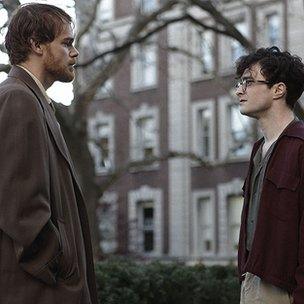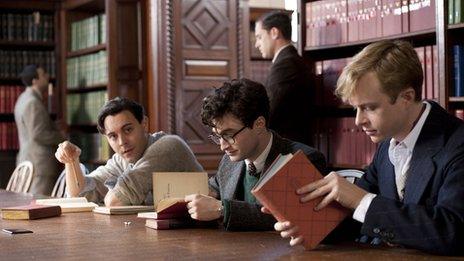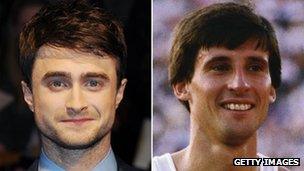Radcliffe's relish at challenge of playing Beat poet Ginsberg
- Published
![Dane DeHaan [L] as Lucien Carr and Daniel Radcliffe as Allen Ginsberg](https://ichef.bbci.co.uk/ace/standard/464/mcs/media/images/71184000/jpg/_71184067_kill_darlings2.jpg)
Radcliffe's character Ginsberg falls for Dane DeHaan's Lucien Carr
Harry Potter star Daniel Radcliffe has never been afraid to expose himself - physically and mentally - during his 14-year career, but his latest film role, as Beat poet Allen Ginsberg, pushed him to his limits.
His ventures beyond the boy wizard have already revealed a daring and mature streak, with stage roles including Equus and the all-singing, all-dancing How To Succeed In Business Without Really Trying.
The ghostly Woman in Black, his first film foray outside the Potter juggernaut, was a monster hit - becoming the most successful horror movie in 20 years.
But it was his latest role in Kill Your Darlings, the searing tale of lust and murder engulfing three founders of the Beat generation, where he feels he has finally proved himself.
Radcliffe, 24, describes playing 17-year old poet Allen Ginsberg, external as his "biggest jump forward" since Equus, which was about a disturbed youngster who blinds horses.
In the film, the budding poet leaves his troubled home to join New York's Columbia university in 1943, where he meets the other "Beats", explores his emerging homosexuality and experiments with drugs.

Dexter star Michael C Hall [L] plays the fated David Kammerer
"It's the first time I've ever watched myself on screen and been pleased and proud, because I showed more range," he says.
"That's what I've been trying to do for a long time and I think Kill Your Darlings is the first time I've succeeded on film."
The key for him was learning not to be "so self-conscious and concerned about how I'm looking", which "freed me up as an actor".
This turned out to be timely, as the role is definitely not for the timid.
A true story, it is based on the early relationships between Ginsberg, Jack Kerouac and William S Burroughs, before they went on to become leading names of US literature.
The film sees Ginsberg's world open up after he meets the troubled but charismatic Lucien Carr (Dane DeHaan), Kerouac (Jack Huston) and Burroughs (Ben Foster).
Both Ginsberg and David Kammerer (Dexter star Michael C Hall), an English teacher on the fringes of the group, share an infatuation with Carr.
But their relationships sour as the film progresses, as unrequited love and frustration abound.
The film, while focusing on Ginsberg's self-discovery, ultimately climaxes in the well-documented but shocking moment when Carr murders Kammerer in 1944.
Radcliffe, who sat in on the auditions with director John Krokidas, is full of praise for his co-star DeHaan, saying he plays Carr "brilliantly".
"I read with eight different actors, all of whom were very good, a really interesting young group of actors, but Dane had an intensity and a charisma and he's electric - he just switches on and he's amazing," he says.
"Dane is probably the best friend I've made in terms of actors through film-making."

The film, whose stars include Jack Huston, Daniel Radcliffe and Dane DeHaan, portrays the Beat writers as young men
Once on set, challenges for Radcliffe began almost immediately, the first of which was the direction to "cry uncontrollably".
"I said to John, I've never cried on screen before properly and I'm very nervous about that," he says, adding that Krokidas "said to trust him, and that he'd get me there".
Within the first two weeks, Radcliffe sobbed openly three times without the use of "tear sticks", an irritant sometimes used by actors to get the tears flowing.
"It was a very cathartic experience," he says. "Crying in front of a group of people... is amazingly liberating. And once you've done it, it felt like some hurdle had been got over. It was a good feeling."
He adds that although he felt pressure to give an accurate portrayal of Ginsberg, he had "a little more licence" as the young poet was still "fresh-faced and fresh-voiced".
'Beautiful' sex scene
"One of the things we talked about before the film was the voice and the accent. We didn't want him to be the Allen who everyone knows, who smoked a million cigarettes and had done loads of drugs," Radcliffe says.
Another large element of the film is Ginsberg's burgeoning sexuality, including a scene in which he loses his virginity to another man.
Radcliffe is very matter-of-fact about the sequence. There was only an hour set aside to shoot it, meaning "there wasn't time for being ponderous and nervous".
"John talked me through the mechanics of gay sex very effectively and then he stood off-camera and shouted direction as we filmed.
"He was really providing a commentary for what we were doing and I think it is a beautiful scene and it's touching and sweet, because of how scared Alan is."
Radcliffe recounts how Krokidas told him he had never seen a "proper loss-of-virginity gay sex scene on screen before" and that "Brokeback Mountain was 'far too easy'", with the actors making it look like their characters "had done it before".
Krokidas wanted to convey "the pain and fear" of Ginsberg's first major sexual experience, and so he had him lying on his back in a "vulnerable position".
Radcliffe admits the scene has left one of his friends "just shell-shocked", but adds: "Maybe it's because I grew up knowing so many gay men, it wasn't a revelation to me."
The Potter star, who is evidently delighted with the film, says it pays homage to the Beats "without being reverential".
It is ultimately about "young love, self-discovery, a young man finding his voice as an artist", he adds.

Daniel Radcliffe is to play Sebastian Coe as he was in 1984
First screened at the Sundance Film Festival in January, Radcliffe has long since moved on, and is currently preparing to play runner Sebastian Coe, now Lord Coe, in a film dramatising his rivalry with fellow Olympian Steve Ovett during their athletic heyday.
Radcliffe says he has no regrets about acting being part of his life for so long. He feels very rooted having growing up on film sets, despite their renown for sending child stars off the rails.
"I'm actually really glad that it happened the way it happened for me," he says.
"I think film sets are wonderful places, and they've got really bad reputations for being negative places for kids to grow up.
"You learn about teamwork and how to function well within a community and how you can make everyone's day better if you come on set with a good attitude.
"You learn lessons on film sets that are lessons in life."
Kill Your Darlings is released in the UK on Friday, 6 December.
- Published30 October 2013
- Published17 October 2013
- Published19 June 2013
- Published20 March 2012